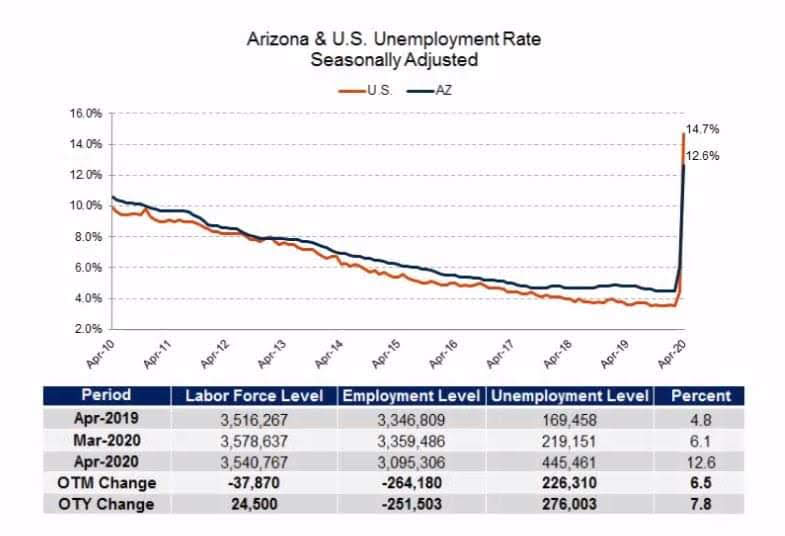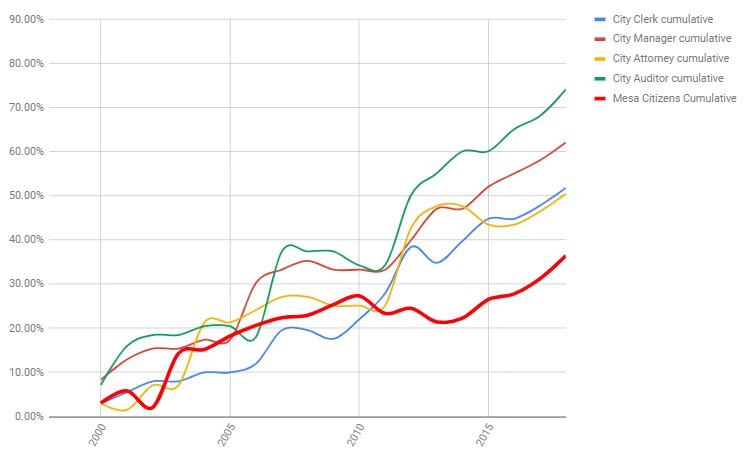The City of Mesa received $90 million in stimulus from the federal government. Of that money, roughly $20 million will be spent to help small businesses impacted by Covid-19. The money will need to be spent on rent, mortgage, or utilities. Applications will open on Monday, May 11th at 8AM. You can apply here – https://www.mesaaz.gov/city-hall/mesa-cares/mesa-cares-small-business-reemergence-program
Frequently Asked Questions
What is the Mesa CARES Small Business Reemergence Program?
The Mesa CARES Small Business Reemergence Program is a grant program made possible by the federal Coronavirus Relief Fund under the CARES Act. It is designed to assist eligible Mesa businesses with up to 90 days of utilities and rent/mortgage payments and is aimed at those businesses who have experienced interruption caused by required COVID-19 business closures or limited service.
Who can apply for the Mesa CARES Small Business Reemergence Program?
This program is intended to assist for-profit, Mesa-based businesses that suffered negative impacts and business interruptions due to required business closures or limited service for the purpose of stemming the spread of COVID-19 that was mandated by an Executive Order of the Arizona Governor.
To review Governor Doug Ducey’s COVID-19 related Executive Orders, please visit https://azgovernor.gov/executive-orders
General Eligibility Requirements:
- Business must be an eligible for-profit business type located at a physical, commercial address in the City of Mesa. Businesses in Maricopa County islands or unincorporated areas of Mesa are not eligible.
- Business has not received any CARES Act funding or COVID-19 related assistance through a federal program such as the Small Business Administration’s Paycheck Protection Program (PPP) or Economic Injury Disaster Loans (EIDL) Emergency Advance.
- Business must have suffered negative financial impacts or business interruptions due to required business closures or limited service, mandated by the Arizona Governor’s Executive Orders regarding COVID-19.
What is the grant amount?
Grant caps are undetermined at this time and applying for funding does not guarantee an applicant will receive any funding award. Once the first round of grant applications is closed and the demand analyzed, the City will determine eligibility of the applicants and award amounts for each business, then contact the applicants.
How do I apply?
Businesses will be able to access and submit the application via a link on this page beginning Monday, May 11 at 8 a.m.
When is the deadline for applications?
The online application submission deadline is Sunday, May 24, 2020 at 5:00PM, (MST). The application and all verification documents must be submitted to the City by that time or the application will be considered incomplete. Technological or other submission difficulties will not excuse the requirement that the application be submitted by the deadline.
I am having problems completing the form online. Can I print the form and deliver it or mail it?
For health and safety reasons, the City is not accepting paper applications or documents. However, a Mesa CARES call center representative can assist you in completing your form. Please call 480-644-CARE (2273). The call center team will be available 8:00AM- 5:00PM Monday – Sunday. Please be prepared to provided call center representatives with the verification documents to be submitted with your application.
If you require special accommodations to complete your application, please call 480-644-2273.
How do I know if my business is in an unincorporated portion of Maricopa County or county island and not within City of Mesa?
Please visit the “Explore Mesa” map at: https://opengis.mesaaz.gov/pages/maps. Click “Search By Location” and type in your address. If the address you entered is in Maricopa County, the map will return a result of “Non-Mesa Location.”
I live in Mesa and am the sole proprietor of a home-based business. I don’t have a commercial address. May I apply for this program?
No. At this time, the program is intended for businesses that are in a “bricks and mortar,“ commercial setting within the city of Mesa and that have been impacted by Executive Orders that mandated closure or limited service. As a home-based business owner, you may be included in a different round of funding or will likely be eligible for funding under the Mesa CARES technical assistance program and/or a future, separate relief program.
What other businesses are not eligible for the program?
Specific types of businesses not eligible for program participation are:
- Franchisees that are not licensed to exclusive Arizona-headquartered franchises.
- Publicly held companies.
- Real estate investment firms.
- Firms involved in speculative activities that develop profits from fluctuations in price rather than through the normal course of trade, such as wildcatting for oil and dealing in commodities futures, when not part of the regular activities of the business.
- Dealers of rare coins and stamps.
- Firms involved in lending activities, such as banks, credit unions, check cashing, finance companies, factors, leasing companies, insurance companies (not agents), and any other firm whose stock in trade is money.
- Pyramid sales plans, where a participant’s primary incentive is based on the sales made by an ever-increasing number of participants. Such products as cosmetics, household goods, and other soft goods lend themselves to this type of business.
- Firms engaged in illegal activities, including the production, servicing, or distribution of otherwise legal products that are to be used in connection with an illegal activity, such as selling drug paraphernalia or operating a motel that permits illegal prostitution.
- Gambling activities, including any business whose principal activity is gambling. While this precludes grants to racetracks, casinos, and similar enterprises, the rule does not restrict grants to otherwise eligible businesses, which obtain less than one-third of their annual gross income from either the sale of official state lottery tickets under a state license, or legal gambling activities licensed and supervised by a state authority, including businesses with an off-track betting license.
- Principle or owner of the business is currently incarcerated or on parole.
- Businesses engaged in the growth, harvest, storage, transport, distribution, use or otherwise providing cannabis for medical or recreational purposes, including cultivation facility, dispensary, and infusion facility.
- Any business owned, in whole or part, by a City of Mesa official or employee who, in their official capacity, participates in the oversight, development or implementation of the Mesa CARES business program.This exclusion also includes any business owned by a relative of such public officer or employee. (A.R.S. § 38-502(9).)
- This list of ineligible businesses may be updated by the City as the program continues.
If I am not eligible for this program, what other resources are available?
The City of Mesa Office of Economic Development has launched the Mesa CARES Business Assistance Center as Mesa’s key source of information and assistance for businesses needing access to financial support programs and resources during the COVID-19 crisis. To discover other resources that may be available, please visit www.selectmesa.com/MesaCARESbusiness.
I own multiple businesses. Can I apply for assistance more than once?
If you have multiple, eligible businesses that are separate legal entities in Mesa, you may submit a separate application for each business.
When will I hear if my application was successful?
The application deadline is Sunday, May 24 at 5:00PM. All applications and verification documents must be submitted at that time or the application will be considered incomplete. The City anticipates that the evaluation period will run approximately 7-10 days during which time City Council will be presented with recommendations. Applicants should check the www.mesaaz.gov/MesaCARES for program updates.
How will awardees be notified?
The City of Mesa will utilize email to communicate with all applicants. Be sure to check your email regularly, including spam folders. We recommend you add MesaCARESBusiness@MesaAZ.gov to your contact list to make sure you receive updates.
What if I don’t have an Employer Identification Number (EIN)/Tax ID?
In Arizona, sole proprietors with no employees can use their social security numbers (SSN) as an EIN.
How do you calculate “Full-time Equivalent” Employees?
The definition of full-time equivalent (FTE) is the hours worked by one employee on a full-time basis. Therefore, two part-time positions (.50 FTE) could be used to equate to 1 FTE. On an annual basis, an FTE is considered to be 2,080 hours, which is calculated as: 8 hours per day x 5 work days per week x 52 weeks per year = 2,080 hours per year
What is considered a Utility?
For the purposes of this grant, a utility can be water, gas, electric, phone, cable, and internet. A bill is required documentation for each utility for which you are seeking assistance. These utilities must be utilities utilized for business operations and cannot be exclusively personal utility accounts of the business owner.
What documentation do I need to provide?
Applicants must submit a W-9. If you don’t have one, you can find this simple form at the IRS website https://www.irs.gov/pub/irs-pdf/fw9.pdf. If you are requesting commercial mortgage assistance, you must provide a bill or statement dated after March 1, 2020 evidencing your mortgage payment. If you are requesting rental assistance, you must provide a bill or invoice dated after March 1, 2020 evidencing your rental amount or a copy of your current lease. If requesting assistance for utilities, you must provide a copy of one bill dated after March 1, 2020 for each utility.
If you have not provided at least two pieces of documentation that verify your Mesa business address, you must upload additional documentation that matches the business address listed on the application. In this case, other acceptable forms of documentation include, but are not limited to, Mesa business licenses, articles of incorporation or other proof from the Arizona Corporation Commission, last submitted tax return and recent supplier invoices.
If you require special accommodations to complete your application, please call 480-644-2273











